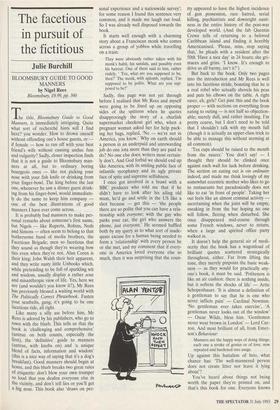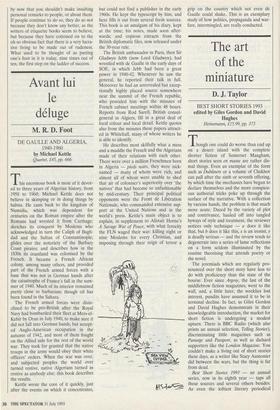The facetious in pursuit of the fictitious
Julie Burchill
BLOOMSBURY GUIDE TO GOOD MANNERS by Nigel Rees Bloomsbury, £9.99, pp. 360 The title, Bloomsbury Guide to Good Manners, is immediately intriguing. Quite what sort of recherché hints will I find here? you wonder. How to drown oneself without offending one's house guests, or if female — how to run off with your best friend's wife without causing undue fuss and vulgarity? Sadly, closer inspection finds that it is not a guide to Bloomsbury man- ners at all, but to ordinary boring bourgeois ones — like not picking your nose with your fish knife or drinking from your finger-bowl. The king before the last one, whenever he saw a dinner guest drink- ing from his finger-bowl, would immediate- ly do the same to keep him company one of the best illustrations of good manners I have ever come across.
It is probably bad manners to make per- sonal remarks about someone's first name, but Nigels — like Ruperts, Robins, Neds and Simons — often seem to belong to that bothersome band of media brothers, the Facetious Brigade; men so facetious that they sound as though they're wearing bow ties even when they're not. Alan Coren is their king; John Walsh:their heir apparent, and they write nasty little Unbooks which, while pretending to be full of sparkling wit and wisdom, usually display a rather sour and misanthropic view of life. Yes, here we are (and wouldn't you know it?), Mr Rees has previously blessed a waiting world with The Politically Correct Phrasebook. Fasten your seatbelts, gang; it's going to be one facetious ride, all right.
Like many a silly ass before him, Mr Rees is adored by his publishers, who go to town with the blurb. This tells us that the book is 'challenging and comprehensive' (untrue on both counts, especially the first), the 'definitive' guide to manners (untrue, with knobs on) and 'a unique blend of facts, information and wisdom' (this is a nice way of saying that it's a dog's breakfast). Good manners should begin at home, and this blurb breaks two great rules of etiquette: don't blow your own trumpet so loud that you deafen everyone else in the vicinity, and don't tell lies or you'll get a big nose. This book also 'draws on per- sonal experience and a nationwide survey'; for some reason I found this sentence very common, and it made me laugh out loud. So I was already well disposed towards the book.
It starts well enough with a charming story about a Franciscan monk who comes across a group of yobbos while travelling on a train: They were obviously rather taken with his monk's habit, his sandals, and possibly even his haircut. One of them said to him, rather rudely, "Ere, what are you supposed to be, then?' The monk, with aplomb, replied, 'I'm supposed to be polite. What are you sup- posed to be?'
Sadly, this page was not yet through before I realised that Mr Rees and myself were going to be lined up on opposing sides of the spittoon when he quotes disapprovingly the story of a churlish supermarket checkout girl who, when a pregnant woman asked her for help pack- ing her bags, replied, 'No — we're not in America, you know.' Why on earth should a person in an underpaid and unrewarding job do one iota more than they are paid to do? No one else does; writers most certain- ly don't. And God forbid we should end up like America, with its smiling public face of infantile sycophancy and its ugly private face of spite and supreme selfishness. I once got involved in a brawl with a BBC producer who told me that if he didn't have to look after his ailing old mum, he'd go and settle in the US like a shot because — get this — 'the people there are so polite that you can have a rela- tionship with everyone; with the guy who parks your car, the girl who answers the phone, just everyone.' He seemed baffled both by my query as to what sort of inade- quate, excuse for a human being needed to form a 'relationship' with every person he or she met, and my comment that if every- one in America loved everyone else so much, then it was surprising that the coun- try appeared to have the highest incidence of gun possession, race hatred, serial killing, psychiatrists and downright nasti- ness in the entire history of the post-war developed world. (And the fab Quentin Crewe tells of returning to a beloved Caribbean island and finding it horribly Americanised. 'Please, miss, stop saying that,' he pleads with a resident after the 50th 'Have a nice day' in 24 hours; she gri- maces and grins. 'I know. It's enough to drive us all barmy, isn't it?') But back to the book. Only two pages into the introduction and Mr Rees is well into his facetious stride, boasting that he is a real rebel who actually shovels his peas and puts his elbows on the table. A right raver, eh, girls? Get past this and the book proper — with sections on everything from eating to outing — is not half so objection- able; merely dull, and rather insulting. I'm pretty coarse, but I don't need to be told that I shouldn't talk with my mouth full (though it is actually an upper-class trick to be able to manage this without seeming at all common).
`Tea cups should be raised to the mouth from the saucer.' You don't say! — I thought they should be clinked once against each wall for luck before drinking. The section on eating out is yin ordinaire indeed, and made me think lovingly of my somewhat eccentric mother who likes to go to restaurants but paradoxically does not like to eat 'in front of people'. Taking her out feels like an almost criminal activity ascertaining when the joint will be empty, sneaking in from the bar hoping no one will follow, fleeing when disturbed. She once disappeared mid-course through some French windows, never to return, when a large and spirited office party walked in.
It doesn't help the general air of medi- ocrity that the book has a wagonload of brilliant quotes scattered strategically throughout, either. Far from lifting the tone, they merely pinpoint the basic weak- ness — as they would for practically any- one's book, it must be said. 'Politeness is like an air cushion: there is nothing inside, but it softens the shocks of life' — Artie Schopenhauer. 'It is almost a definition of a gentleman to say that he is one who never inflicts pain' — Cardinal Newman. `No gentleman ever takes exercise', 'A gentleman never looks out of the window' — Oscar Wilde, bless him. 'Gentlemen never wear brown in London' — Lord Cur- zon. And most brilliant of all, from Emer- son's Behaviour:
Manners are the happy ways of doing things; each one a stroke of genius or of love, now repeated and hardened into usage.
Up against this battalion of brio, what chance has: 'The well-mannered person does not create litter nor leave it lying about'?
You've heard about things not being worth the paper they're printed on, and that's this book for one. Everyone knows by now that you shouldn't make insulting personal remarks to people, or about them. If people continue to do so, they do so not because they don't know any better, as the writers of etiquette books seem to believe, but because they have cottoned on to the oh so obvious fact that there is a very lucra- tive living to be made out of rudeness. What used to be thought of as putting one's foot in it is today, nine times out of ten, the first step on the ladder of success.



















































 Previous page
Previous page